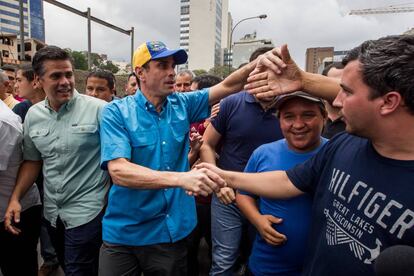Venezuela rules out recall referendum after declaring state of emergency
Opposition insists there are hardliners in ruling party who want to oust President Nicolás Maduro

Just hours after it imposed a 60-day state of emergency giving President Nicolás Maduro extra powers, Venezuela’s government has roundly rejected the opposition’s demands for a recall referendum.
“Maduro isn’t going to be removed, with a referendum or anything else,” said Vice President Aristóbulo Istúriz.
Jesús Torrealba, the secretary general of the opposition MUD grouping, accused the government of trying to hold onto power at any price. “The strategy is to delay the referendum so as to sabotage the opposition and to perpetuate this government,” he said.
President Nicolas Maduro declared the two-month state of emergency on Friday due to what he called plots from within the country and the United States to topple his leftist government.
President Nicolás Maduro declared the two-month state of emergency on Friday due to what he called plots from within the country and the United States to topple his leftist government
Venezuela's opposition is seeking to recall the leader amid a worsening crisis that includes food and medicine shortages, frequent power cuts, sporadic looting and rampant inflation.
The opposition says that the ruling United Socialist Party of Venezuela (PSUV), founded by former president Hugo Chávez, is split, and that hardliners want to oust Maduro and take over the presidency. “Maduro is now just charging ahead blindly. He doesn’t want a referendum, he wants the country to implode,” said Torrealba at a protest march on Saturday calling on the election commission, which is controlled by the government, to stop delaying a recall referendum.
The opposition has said it will continue to stage street protests and demonstrations – another is planned for Wednesday – but can do little until the commission makes a decision.
Maduro said on Friday that he was declaring a state of emergency to increase the country’s ability to face outside threats, citing Colombia's former president Alvaro Uribe's demand for intervention in Venezuela by foreign troops. He added that the previous state of exception included decrees "to protect the people and the socioeconomic stability of the country."
U.S. intelligence officials told reporters on Friday they were increasingly worried about the potential for an economic and political meltdown in Venezuela and predicted Maduro was not likely to complete his term.
The state of emergency gives more power to the military, further isolating Maduro. Under this president, former leader Hugo Chávez’s project has stalled, the economy is in tatters and opposition leaders have been jailed. A recent survey by pollsters Datanálisis shows that Maduro’s popularity has fallen to new lows over the last three years, and that just 26.8% of the population supports him.
English version by Nick Lyne.
Sign up for our newsletter
EL PAÍS English Edition is launching a weekly newsletter. Sign up today to receive a selection of our best stories in your inbox every Saturday morning. For full details about how to subscribe, click here.
Tu suscripción se está usando en otro dispositivo
¿Quieres añadir otro usuario a tu suscripción?
Si continúas leyendo en este dispositivo, no se podrá leer en el otro.
FlechaTu suscripción se está usando en otro dispositivo y solo puedes acceder a EL PAÍS desde un dispositivo a la vez.
Si quieres compartir tu cuenta, cambia tu suscripción a la modalidad Premium, así podrás añadir otro usuario. Cada uno accederá con su propia cuenta de email, lo que os permitirá personalizar vuestra experiencia en EL PAÍS.
¿Tienes una suscripción de empresa? Accede aquí para contratar más cuentas.
En el caso de no saber quién está usando tu cuenta, te recomendamos cambiar tu contraseña aquí.
Si decides continuar compartiendo tu cuenta, este mensaje se mostrará en tu dispositivo y en el de la otra persona que está usando tu cuenta de forma indefinida, afectando a tu experiencia de lectura. Puedes consultar aquí los términos y condiciones de la suscripción digital.









































